Available Copies from Independent Booksellers

Joyce, James. Ulysses. The Egoist Press, London, 1922.
Price: US$12500.00 + shipping
Description: First British edition. (Published by John Rodker in London, October of 1922, following the Paris printing in February the same year. Technically printed in France, but for British private distribution.) [vi], 732 pp. Bound in publisher's printed wraps, on handmade paper. Copy #275 in a limitation of 2000. Near Fine with the fragile wraps in truly excellent shape; very rarely found unsophisticated with such little wear, especially on the spine, which typically has much, much more chipping and wear; no restoration done to it. Typical toning to contents, bump to bottom right corner with a hint of creasing. A literary milestone in wonderful shape.
Seller: Burnside Rare Books, ABAA, Portland, OR, U.S.A.
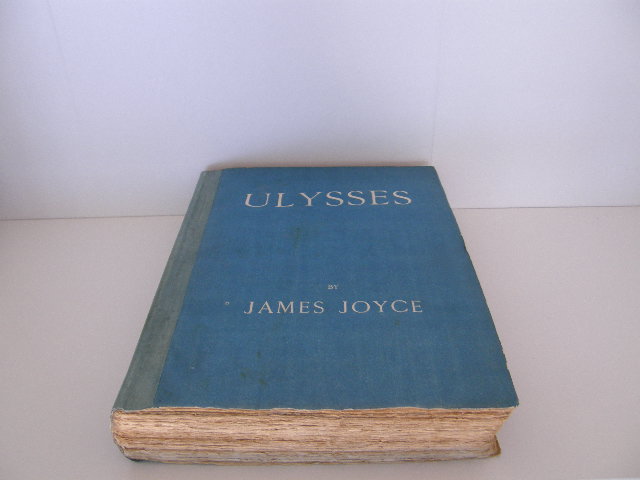
Joyce, James. Ulysses. Shakespeare and Company, Paris, 1922.
Price: US$22500.00 + shipping
Condition: Near Fine
Description: First Edition, First Printing. This is number 569 one of 750 numbered copies. The book is great shape and is bound in the publisher's wrappers but with a blue leather spine. The pages are clean with NO writing, marks or bookplates in the book. A wonderful copy housed in a custom clamshell slipcase for preservation.
Seller: Magnum Opus Rare Books, Missoula, MT, U.S.A.
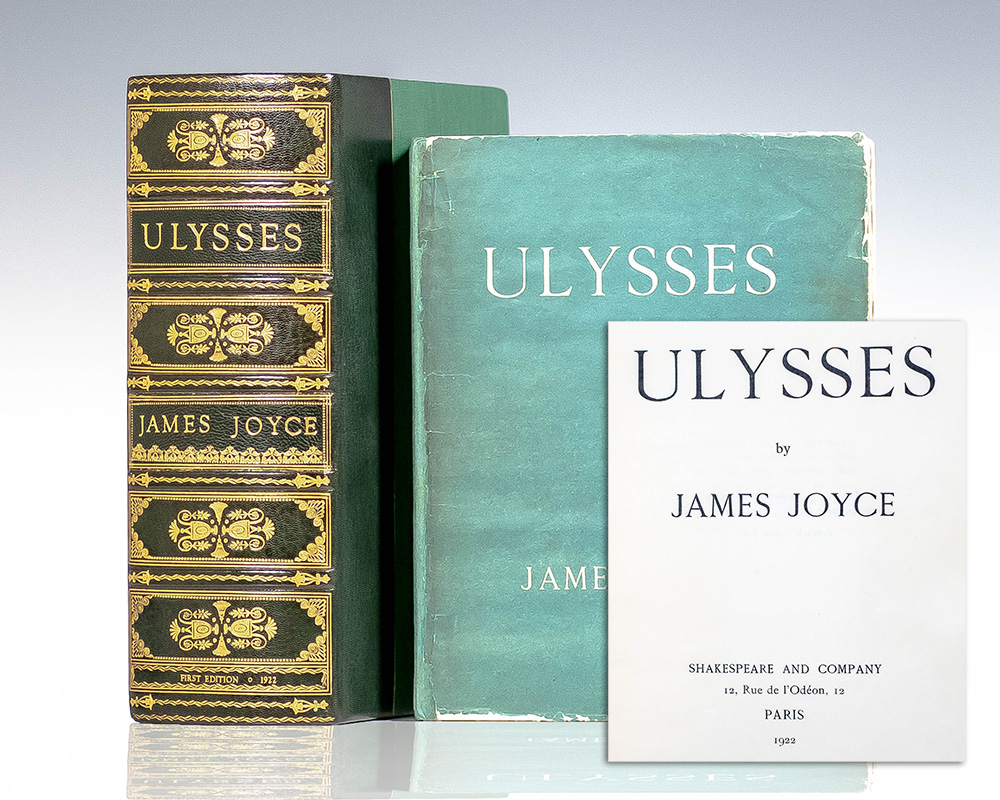
Joyce, James. Ulysses.. Shakespeare and Company, Paris, 1922.
Price: US$25000.00 + shipping
Description: First edition of Joyce's masterpiece, one of 750 numbered copies printed on handmade paper from a total edition of 1000 copies, this is number number 276. Thick quarto, original blue and white wrappers. In very good condition with some expert restoration to the spine. Housed in a custom half morocco chemise and clamshell box. Ulysses was published in Paris by Shakespeare & Company, 1922. It was a struggle for the author to find a publisher, a comic irony considering that Ulysses is "[u]niversally hailed as the most influential work of modern times" (Grolier Joyce 69). Ulysses was an immediate success. The first printing sold out, and "within a year Joyce had become a well-known literary figure. Ulysses was explosive in its impact on the literary world of 1922" (de Grazia, 27). Even so, the book faced difficulties in global reception. It was banned in the U.K. and was prosecuted for the obscenity in the Nausicaa episode (Ellmann, 1982). Joyce's inspiration for the novel began as a young boy reading Charles Lamb's Adventures of Ulysses and writing an essay entitled "My Favorite Hero" after being impressed by the wholeness of the character (Goreman, 1939). The idea for the novel grew from a story in Dubliners in 1906, which Joyce expanded into a short book in 1907, before reconceptualizing it as the heady novel in 1914 (Ellmann, 1982). The book can initially seem unstructured and chaotic, and Joyce admitted that he "put in so many enigmas and puzzles that it will keep the professors busy for centuries arguing over what I meant" (The Observer, 2000). The French translator Stuart Gilbert published a defense of Ulysses shortly after its publication in which he supported the novel's use of obscenity and explained its internal structure and links to the Odyssey against accusations of ambiguity. Every episode, Gilbert explained, is connected to the Odyssey by theme, technique, and correspondence between characters. Another instance of Ulysses' literary contribution is his use of stream-of-consciousness, a technique employing carefully structured prose, both humorous and charactering, and involving puns and parodies. Joyce was a precursor to the use of stream of consciousness in the later decades. Similar narrative techniques were used by his contemporaries Virginia Wolfe, William Faulkner, and Italo Svevo. Their style can be better characterized as an "interior monologue, rather than stream of consciousness, is the appropriate term for the style in which [subjective experience] is recorded, both in The Waves and in Woolf's writing generally" (Stevenson, 1992).
Seller: Raptis Rare Books, Palm Beach, FL, U.S.A.
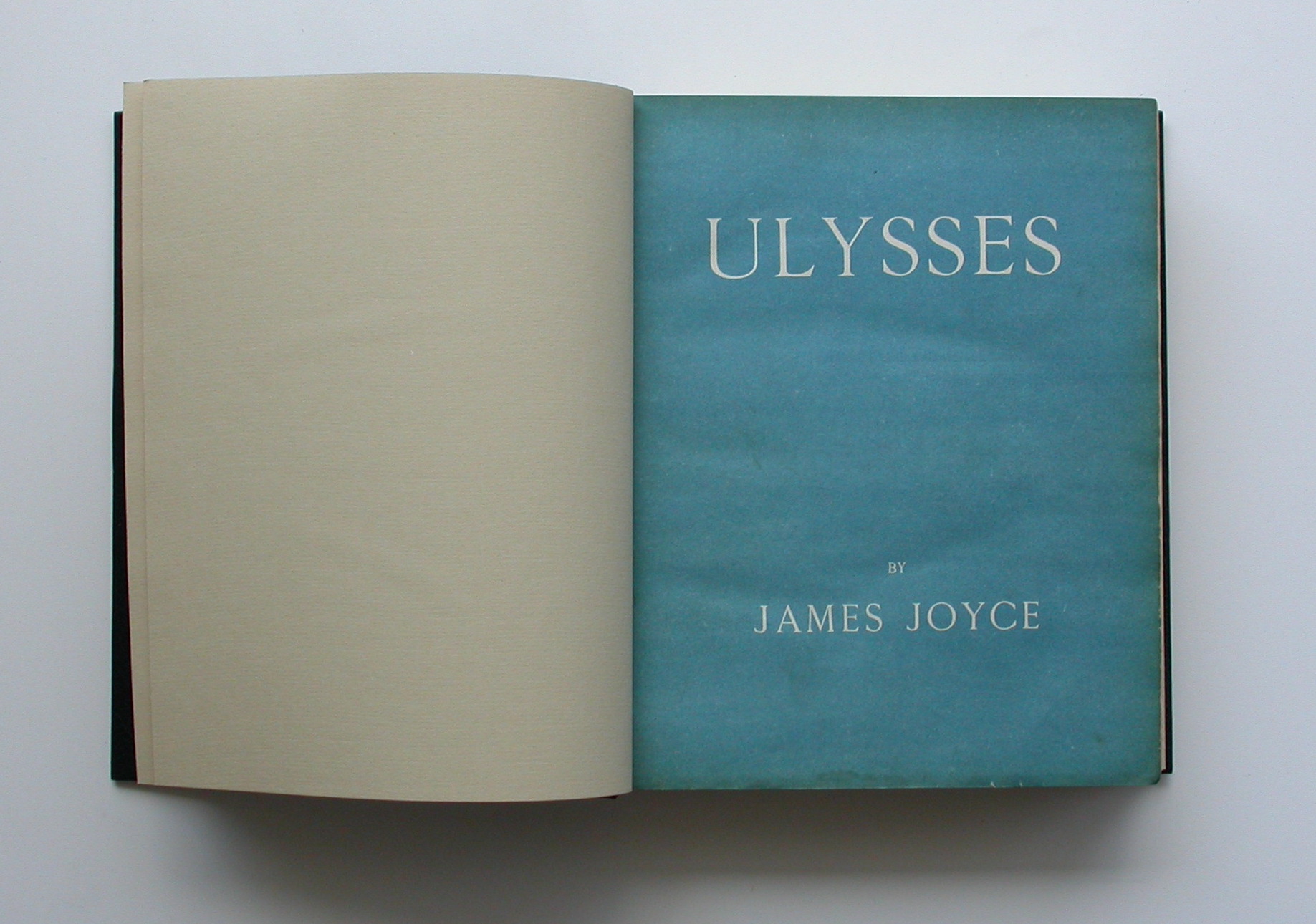
James Joyce. Ulysses. Paris: Shakespeare and Company,, 1922.
Price: US$31042.91 + shipping
Condition: As New
Description: First Edition, First Printing. This is number 959 of the edition of 750 numbered copies (of a total edition of 1000 copies). Original blue wrappers - front and back - bound in. A tall copy (leaf size 183 by 235mm) in near fine state: the wrappers very fresh, the pages clean, only the edges slightly browning. Most beautifully bound in different dark blue leathers by renowned Swiss bookbinder Jean Luc Honegger (and signed by him). While we always prefer unbound books in their original condition, Ulysses is such a fragile book that we have come to love bound issues: you can take the book into your hands ("yes"), read it ("yes") and appreciate it much more ("Yes.").
Seller: Yves G. Rittener - YGRbookS, Zürich, Switzerland
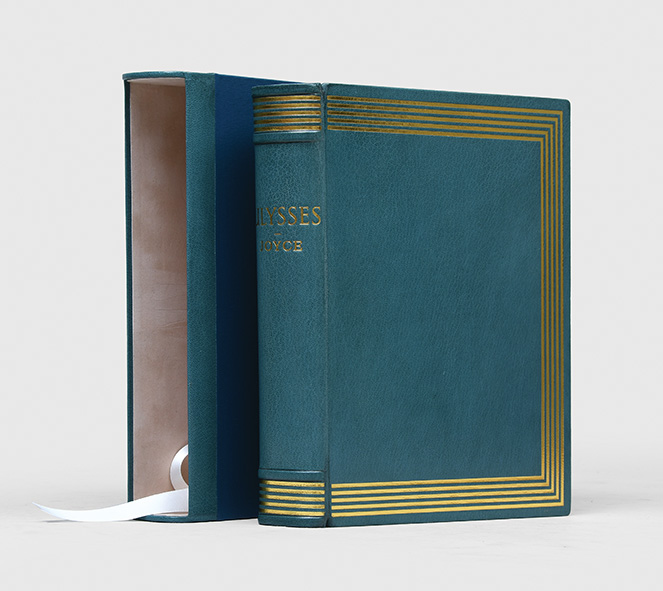
JOYCE, James.. Ulysses.. Paris: Shakespeare and Company, 1922, 1922.
Price: US$32021.59 + shipping
Description: First edition, number 418 of 750 copies on handmade paper numbered 251 to 1,000. This attractive copy is finely bound, retaining the distinctive original blue wrappers at the front and rear. The edition was published on 2 February 1922 in imitation of the traditional three-tiered French format, which was aimed at both connoisseurs and general readers. It consisted of 100 signed copies on Dutch handmade paper, 150 large-paper copies printed on heavier vergé d'Arches, and 750 copies on vergé à barbes, which formed the trade issue. One of the key texts of 20th-century modernist literature, Ulysses also proved a major test case for laws of freedom of expression. "Forced underground by censors, this was a cryptoclassic already before it was read, a subversive colossus" (Sherry, p. 1). Its creator is considered one of the great geniuses of modern literature: "Joyce, not to mince words, is Ireland's Shakespeare, its Goethe, its Racine, its Tolstoy" (Sutherland). Horowitz, Census, p. 121; Slocum & Cahoon A17. Brian Patrick Duggan, Saluki: The Desert Hound and the English Travelers Who Brought It to the West, 2014; Vincent Sherry, Joyce: Ulysses, 2004; John Sutherland, "Ireland's Shakespeare", The Guardian, 10 Feb. 2004. Small quarto (234 x 184 mm). Finely bound by the Chelsea Bindery in greenish blue morocco, spine lettered in gilt, quintuple gilt ruled border to spines and covers, turn-ins ruled in gilt, cream endpapers, top edge gilt, others untrimmed, original wrappers bound in. Housed in a matching leather entry slipcase by the Chelsea Bindery. A fine copy.
Seller: Peter Harrington. ABA/ ILAB., London, United Kingdom
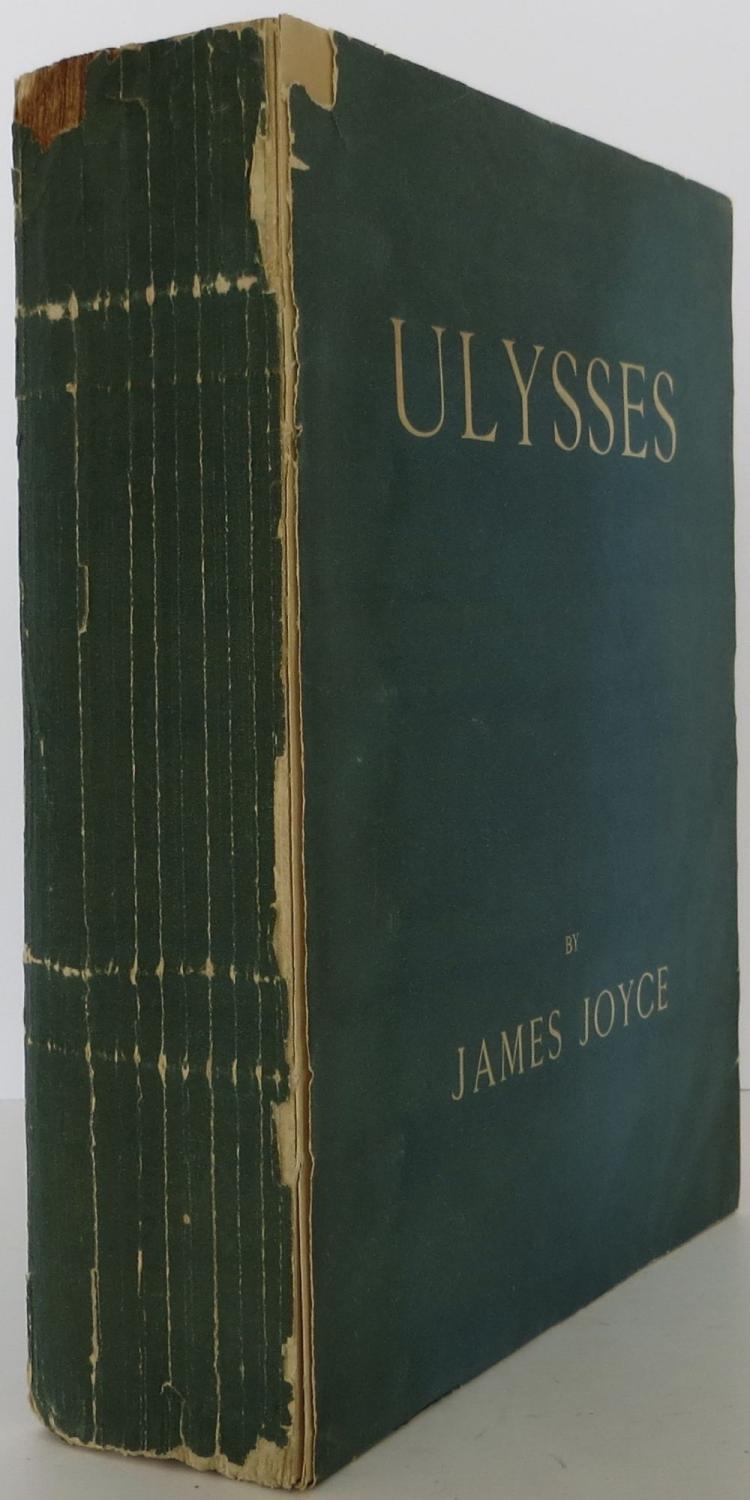
Joyce, James. Ulysses. Shakespeare and Co, Paris, 1922.
Price: US$39500.00 + shipping
Condition: Very Good
Description: Small quarto. Original blue wrappers, titles to upper wrapper in white. In a blue quarter morocco case. Very good condition with a chip at the ipper left corner of the front panel of the dj. From a total edition of 1000 copies, this is one of the last 750 on handmade paper. Some pages uncut at top.
Seller: Bookbid, Beverly Hills, CA, U.S.A.

James Joyce. Ulysses. Shakespeare and Company, 1922.
Price: US$40000.00 + shipping
Condition: Near Fine
Description: This is the original 1922 text, limited to 1000 copies published by Shakespeare and Company, this being # 784 (used for the Orchises Press facsimile, a copy of which is included). Rebound in teal green, the color to which most of the 1922 covers have oxidized. The front cover is bound into the text. Clean throughout, deckle edges. Please see my attached photos of the two books included in your purchase. More photos and information available on request.
Seller: Virginia Books & More, Spotsylvania, VA, U.S.A.
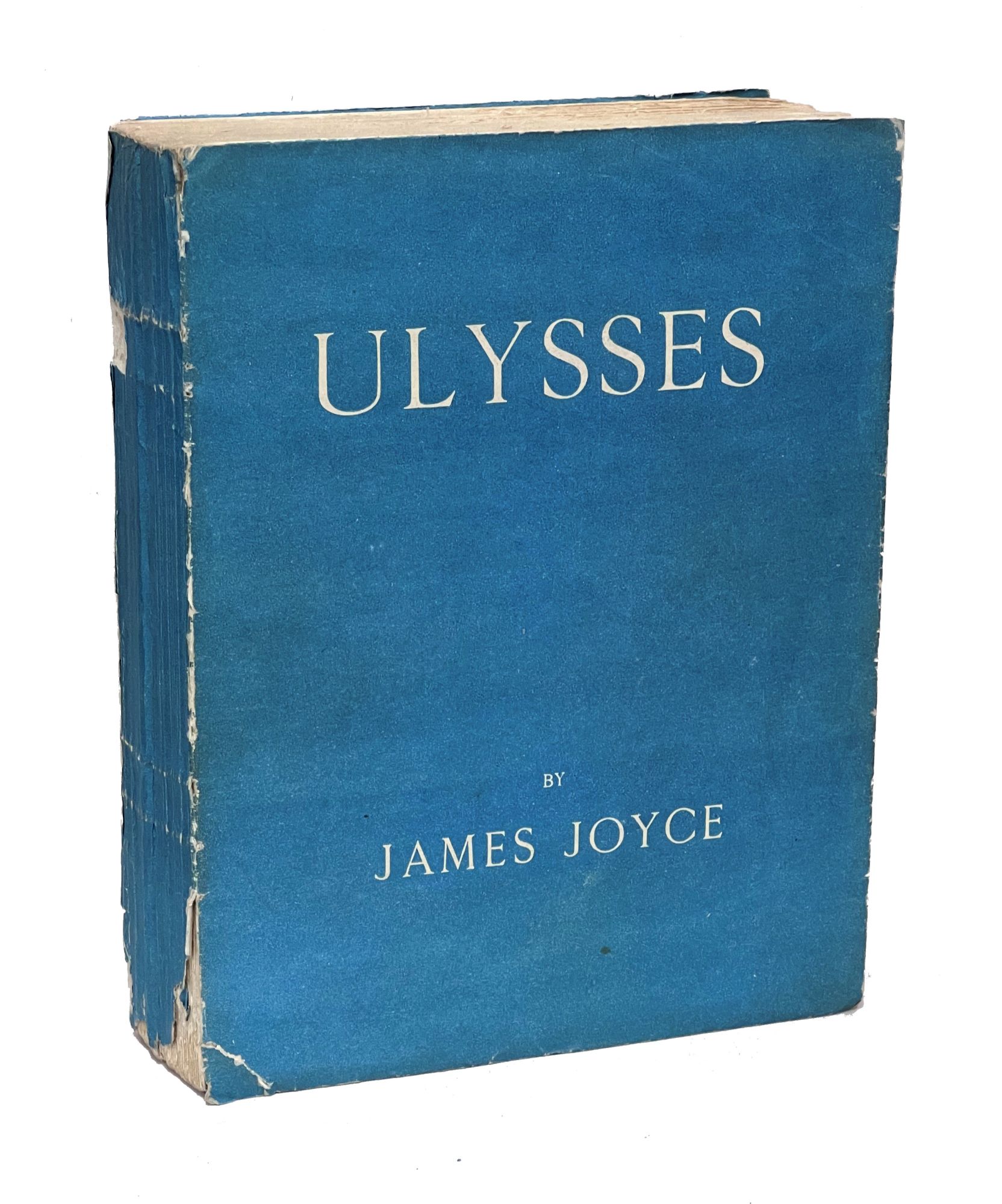
Joyce, James. Ulysses. Paris: Shakespeare and Company, 1922.
Price: US$45000.00 + shipping
Description: First edition. Limited to 1000 copies. The 1000 copies were divided into three limitations: 100 copies (nos. 1-100) printed on Dutch paper and signed by Joyce; 150 copies (nos. 101-250) printed on Vergé d'Arches paper; and the final 750 copies (nos. 251-1000) printed on linen paper, of which this is number 349. Original publisher's teal paper wrappers, lettered in white. Light rubbing to wrapper edges, wear to spine with a small chip below first spine band and some loss to lower spine, very mild crease to first several leaves, front wrapper joint tender but holding. Housed in custom slipcase with folding chemise, slipcase with some wear. Joyce's masterpiece, Ulysses, was first published serially in The Little Review from March 1918 to December 1920, at which time copies of the magazine were seized and the magazine's publishers were taken to trial due to the sexually explicit nature of the novel. Because of the controversy surrounding Ulysses, Joyce was unable to find a publisher for the book until his friend Sylvia Beach, the American owner of Shakespeare and Company bookstore in Paris, agreed to publish it. This first book edition was published in February 1922, in a limited run of 1000 copies. For a number of years, the book was banned and suppressed in various countries, though a turning point came on December 6, 1933 when U. S. Judge John Munro Woolsey ruled that the book was not obscene. It is now recognized as one of the most important works of Modernist literature. Assessing the impact of Ulysses, T. S. Eliot said of Joyce, "He single-handedly killed the 19th century." Ulysses is a stream-of-consciousness novel that follows Leopold Bloom through Dublin on an ordinary day (June 16, 1904 - notably the same day that Joyce first went on a date with Nora Barnacle, who would later become his wife). The book is heavily fragmented and allusive, with a structure that loosely parallels Homer's same-titled epic. Regarding the book's complexity, Joyce famously said, "I've put in so many enigmas and puzzles that it will keep the professors busy for centuries arguing over what I meant, and that's the only way of ensuring one's immortality."
Seller: B & B Rare Books, Ltd., ABAA, New York, NY, U.S.A.

JOYCE, JAMES.. Ulysses. Paris: Shakespeare & Co., 1922, 1922.
Price: US$65000.00 + shipping
Description: First Edition; one of 750 numbered copies (this is no. 843; the special issues of 100 and 150 were also numbered). Original publisher's wrappers. Minor rubbing and soiling of the wrappers; a little short of fine, but an excellent, unrestored copy. Never having read this effusively praised and influential book, this cataloguer will refrain from plagiarizing those who are actually familiar with it. In a custom clamshell box. All books described as first editions are first printings unless otherwise noted.
Seller: Peter L. Stern & Co., Inc, Newton, MA, U.S.A.
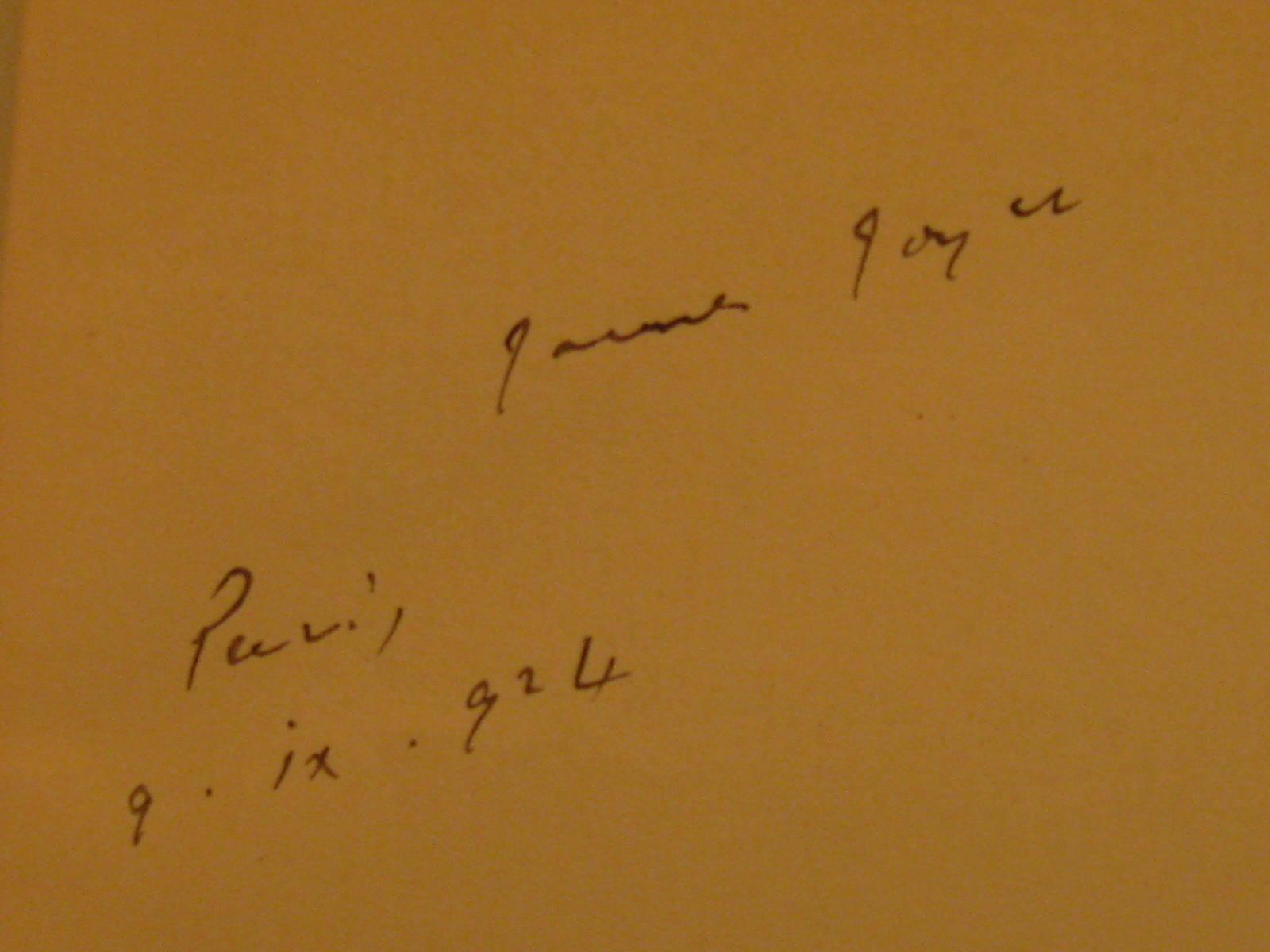
Price: US$65000.00 + shipping
Condition: Very Good
Description: Specially bound in full leather in 2 volumes. This is number 389 of a the special 750 copies printed on handmade, laid paper. Signed and dated in ink by James Joyce: "James Joyce, Paris, 9. ix. 1924" on the front endpaper following the front blue wrapper. Joyce's Signature has been authenticated by Glenn Horowitz of NYC. Volume I contains 370 pages. Volume II begins on page 371 and and ends on p. 732 with the "Trieste-Zurich-Paris, 1914-1921" dateline. The next page is printed in capital letters: "Printed for Sylvia Beach by Maurice Darantiere at Dijon, France." The rear wrapper is not present at the end of volume two. Both volumes have been specially bound in full leather with 4 gilt rectangular rules and a delicate inner rectangle of hand-tooled chain patterns culminating in larger floral designs at the inside corners of the front and rear boards. Both front boards bear the name of "JOAN" in vertical gilt capital letters. The spine of volume I is missing 6" of the 9.5" of the spine length, but the top portion with "I" is present. The front blue wrapper printed in White with "Ulysses" by James Joyce is clean and crisp, as is the text throughout volumes one and two. The top edges are gilded. And there are predominantly orange and grey marbled endpapers. There is hand-tooled dentelle gilding along the front and rear inside edges of the boards as well. Both volumes have some pencil scrawlings on the front endpapers, but nothing affecting the text. Despite the unusual two-volume format and the missing rear wrapper, modern first edition authority Allen Ahearn opined that this signed and dated copy in Joyce's hand of one of the 750 specially printed first editions is perhaps as scarce as one of the 100 signed copies, given that none of the 750 copies was issued with Joyce's signature. This copy was signed and dated two years after publication in 1924. This edition is limited to 1000 copies: 100 copies (signed) on Dutch handmade paper numbered from 1 to 100; 150 copies on vergé d'Arches numbered from 101 to 250; 750 copies on handmade paper numbered from 251 to 1000. This is copy No. 389. "The publisher asks the readers indulgence for typographical errors unavoidable in the exceptional circumstances. S.B." In a review in The Dial, T.S. Eliot said of Ulysses: "I hold this book to be the most important expression which the present age has found; it is a book to which we are all indebted, and from which none of us can escape." He went on to claim that Joyce was not at fault if people after him did not understand it: "The next generation is responsible for its own soul; a man of genius is responsible to his peers, not to a studio full of uneducated and undisciplined coxcombs." The book has its critics; Virginia Woolf stated that "Ulysses was a memorable catastropheimmense in daring, terrific in disaster." Ulysses has been called "the most prominent landmark in modernist literature", a work where life's complexities are depicted with "unprecedented, and unequalled, linguistic and stylistic virtuosity." That style has been stated to be the finest example of the use of stream-of-consciousness in modern fiction, with the author going deeper and farther than any other novelist in handling interior monologue. This technique has been praised for its faithful representation of the flow of thought, feeling, mental reflection, and shifts of mood. (Wikipedia) First Edition, One of 750 numbered copies
Seller: Brainerd Phillipson Rare Books, Holliston, MA, U.S.A.

Joyce, James. Ulysses. Paris: Shakespeare and Company, 1922.
Price: US$67729.98 + shipping
Condition: As New
Description: Paris: Shakespeare and Company, 1922. First Edition, First Printing. Original blue printed wrappers. 4to. This is number 986 of the edition of 750 numbered copies of a total edition of 1000 copies (+ some more described below). Very minor wear to extremities of the spine and some slight toning to the wrappers, else a lovely copy: uncut, mostly unopened and completely untouched by any restorer. Small contemporary portrait of Joyce by C. Rup mounted on the recto of the half-title (taken from the original subscriber's form, which is in itself very rare) together with the neat signature of Frank Layton, who bought this copy on the 16th of March in 1922 according to Sylvia Beach's "Ulysses" Notebook. There are six known versions of the first edition of Ulysses: 1. Unbound proofs. 2. Review copies that came without the famous blue wrappers. 3-5. The three editions of the published version: 100 signed (3); 150 on large paper (4); 750 regular copies numbered like the one we are offering here (5). 6. There are some unnumbered copies - most prominently the one inscribed to the printer Darantiere - hors commerce. Please note that any copy of the first edition of Ulysses in its original condition is flimsier than any paperback you have ever owned: the book is heavy, the folded blue paper front and back covers only strengthened by a sheet of paper and the spine directly glued on to the book. This copy formed part of the Allan D. McGuire Collection of Cyril Connolly's "The Modern Movement - 100 Key Books from England, France and America 1880-1950" and was also exhibited in the "Allspace in a Notshall" Exhibition in Zürich in 1991. It comes with a beautiful three-quarter morocco slipcase and all the documentation of provenance and exhibtion. The Book of Books on any list of modern fiction (even after 100 years) and a great and funny read at that, which comes here in beautiful condition and with a full record of provenance. It is part of our Catalogue 10: James Joyce.
Seller: Yves G. Rittener - YGRbookS, Zürich, Switzerland
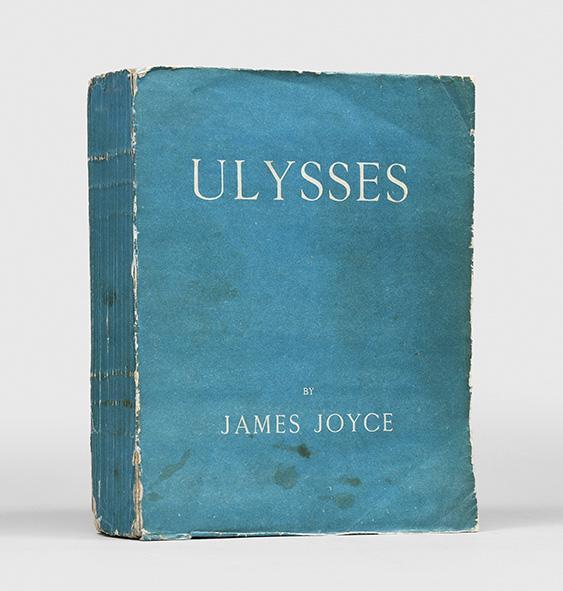
JOYCE, James.. Ulysses.. Paris: Shakespeare and Company, 1922, 1922.
Price: US$70447.51 + shipping
Description: First edition, number 825 of 750 copies on handmade paper numbered 251 to 1,000. Sylvia Beach's notebook records that this copy was one of two dozen sold to "Miss Weaver (on sale)". Harriet Shaw Weaver was Joyce's indispensable patron, without whose munificent backing Portrait of the Artist as a Young Man, Ulysses, and Finnegans Wake might never have been published. As a measure of Weaver's paramount importance to Joyce, he inscribed copy number 1 of Ulysses to her. Ulysses was published in imitation of the traditional three-tiered French format aimed at both connoisseurs and readers: 100 signed copies on Dutch handmade paper; 150 large-paper copies printed on heavier vergé d'Arches, and 750 copies on vergé à barbes forming the smaller trade issue. The novel was published on 2 February 1922. Widely recognized as the key book of 20th-century English literature, Ulysses is among the major works in the modernist canon, and its creator one of the great geniuses of all literature: "Joyce, not to mince words, is Ireland's Shakespeare, its Goethe, its Racine, its Tolstoy" (John Sutherland). The book also proved to be a major test case for laws of freedom of expression. "Forced underground by censors. this was a cryptoclassic already before it was read, a subversive colossus" (Norman Sherry, James Joyce, Ulysses, 2nd edition). Slocum & Cahoon A17. Horowitz, Census, p. 131. Small quarto. Original blue wrappers, titles to cover in white. Housed in a dark blue leather backed bookform box. Mild rubbing to extremities with some loss to wrappers around spine corners, some light soiling but the whole still fresh and attractive, and entirely untouched by restoration, very few trivial spots within, a very good copy indeed. Pencil ownership inscription to first blank of the veterinarian and James Joyce collector, Alfred T. Cowie (1916-2003), dated 1954.
Seller: Peter Harrington. ABA/ ILAB., London, United Kingdom
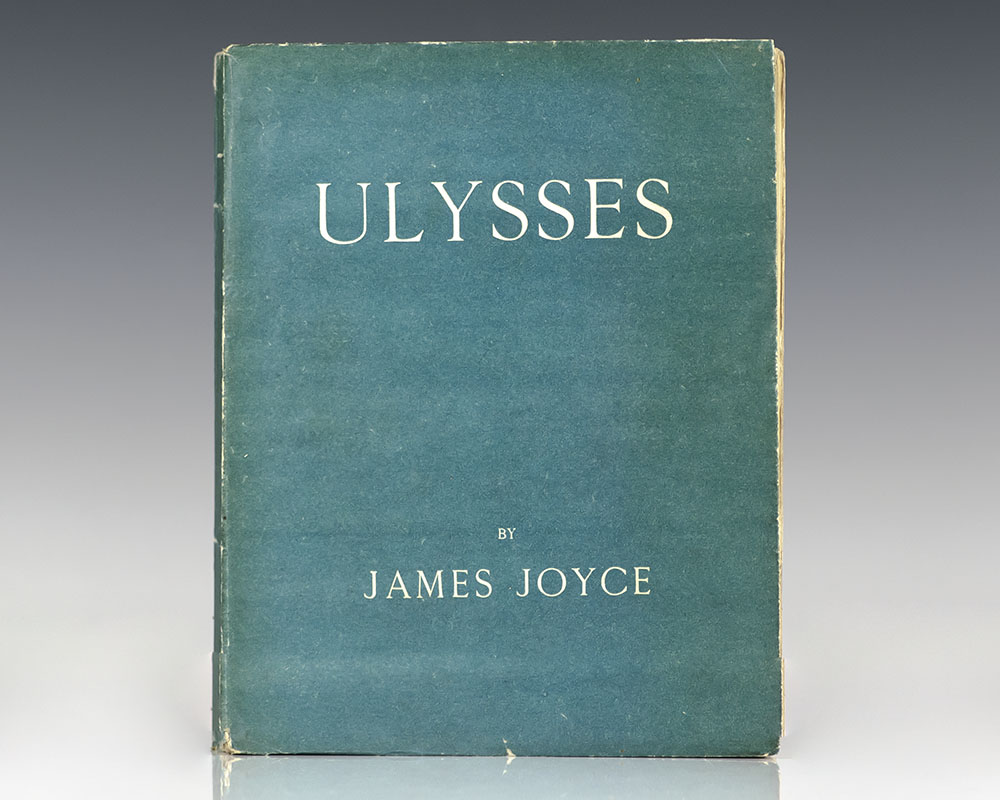
Joyce, James. Ulysses.. Shakespeare and Company, Paris, 1922.
Price: US$75000.00 + shipping
Description: First edition of Joyce's masterpiece, one of 750 numbered copies printed on handmade paper from a total edition of 1000 copies, this is number number 276. Thick quarto, original blue and white wrappers. In near fine condition, square and tight with a touch of rubbing to the crown and foot of the spine. Housed in a custom slipcase. An exceptional example. Ulysses was published in Paris by Shakespeare & Company, 1922. It was a struggle for the author to find a publisher, a comic irony considering that Ulysses is "[u]niversally hailed as the most influential work of modern times" (Grolier Joyce 69). Ulysses was an immediate success. The first printing sold out, and "within a year Joyce had become a well-known literary figure. Ulysses was explosive in its impact on the literary world of 1922" (de Grazia, 27). Even so, the book faced difficulties in global reception. It was banned in the U.K. and was prosecuted for the obscenity in the Nausicaa episode (Ellmann, 1982). Joyce's inspiration for the novel began as a young boy reading Charles Lamb's Adventures of Ulysses and writing an essay entitled "My Favorite Hero" after being impressed by the wholeness of the character (Goreman, 1939). The idea for the novel grew from a story in Dubliners in 1906, which Joyce expanded into a short book in 1907, before reconceptualizing it as the heady novel in 1914 (Ellmann, 1982). The book can initially seem unstructured and chaotic, and Joyce admitted that he "put in so many enigmas and puzzles that it will keep the professors busy for centuries arguing over what I meant" (The Observer, 2000). The French translator Stuart Gilbert published a defense of Ulysses shortly after its publication in which he supported the novel's use of obscenity and explained its internal structure and links to the Odyssey against accusations of ambiguity. Every episode, Gilbert explained, is connected to the Odyssey by theme, technique, and correspondence between characters. Another instance of Ulysses' literary contribution is his use of stream-of-consciousness, a technique employing carefully structured prose, both humorous and charactering, and involving puns and parodies. Joyce was a precursor to the use of stream of consciousness in the later decades. Similar narrative techniques were used by his contemporaries Virginia Wolfe, William Faulkner, and Italo Svevo. Their style can be better characterized as an "interior monologue, rather than stream of consciousness, is the appropriate term for the style in which [subjective experience] is recorded, both in The Waves and in Woolf's writing generally" (Stevenson, 1992).
Seller: Raptis Rare Books, Palm Beach, FL, U.S.A.
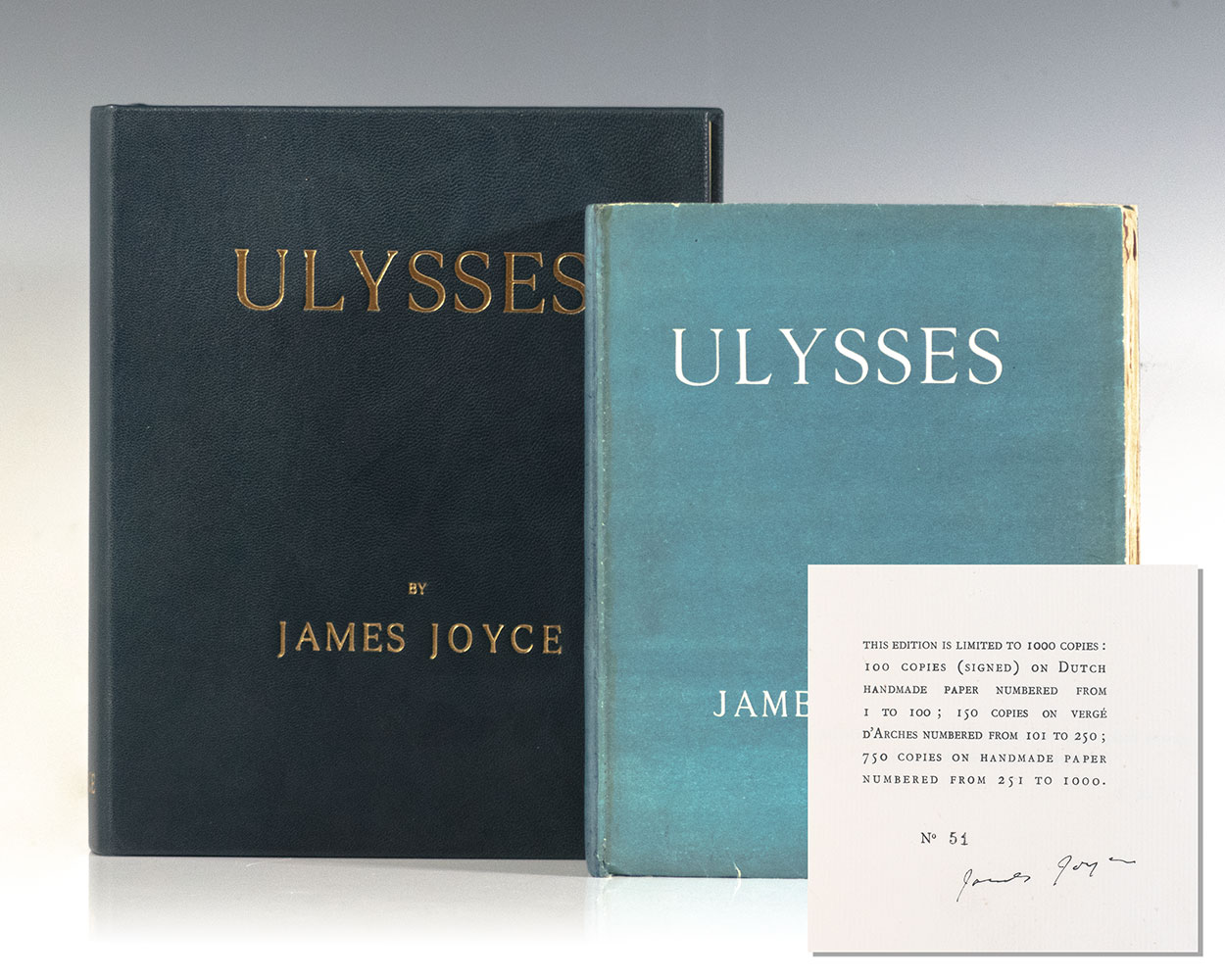
Joyce, James. Ulysses.. Shakespeare and Company, Paris, 1922.
Price: US$300000.00 + shipping
Description: Signed limited first edition of Joyce's masterpiece, one of 100 numbered copies printed on handmade paper from a total edition of 1000 copies, this is number 51. Thick quarto, original blue and white wrappers. Laid in are the following pamphlets: Extracts from Press Notices of UlyssesÂby JamesÂJoyce" and the Shakespeare and Company prospectus for Ulysses, with woodcut vignette of Shakespeare, photographic portrait of Joyce tipped in. In near fine condition, rebacked. Housed in a custom full morocco clamshell box. An exceptional example. Ulysses was published in Paris by Shakespeare & Company, 1922. It was a struggle for the author to find a publisher, a comic irony considering that Ulysses is "[u]niversally hailed as the most influential work of modern times" (Grolier Joyce 69). Ulysses was an immediate success. The first printing sold out, and "within a year Joyce had become a well-known literary figure. Ulysses was explosive in its impact on the literary world of 1922" (de Grazia, 27). Even so, the book faced difficulties in global reception. It was banned in the U.K. and was prosecuted for the obscenity in the Nausicaa episode (Ellmann, 1982). Joyce's inspiration for the novel began as a young boy reading Charles Lamb's Adventures of Ulysses and writing an essay entitled "My Favorite Hero" after being impressed by the wholeness of the character (Goreman, 1939). The idea for the novel grew from a story in Dubliners in 1906, which Joyce expanded into a short book in 1907, before reconceptualizing it as the heady novel in 1914 (Ellmann, 1982). The book can initially seem unstructured and chaotic, and Joyce admitted that he "put in so many enigmas and puzzles that it will keep the professors busy for centuries arguing over what I meant" (The Observer, 2000). The French translator Stuart Gilbert published a defense of Ulysses shortly after its publication in which he supported the novel's use of obscenity and explained its internal structure and links to the Odyssey against accusations of ambiguity. Every episode, Gilbert explained, is connected to the Odyssey by theme, technique, and correspondence between characters. Another instance of Ulysses' literary contribution is his use of stream-of-consciousness, a technique employing carefully structured prose, both humorous and charactering, and involving puns and parodies. Joyce was a precursor to the use of stream of consciousness in the later decades. Similar narrative techniques were used by his contemporaries Virginia Woolf, William Faulkner, and Italo Svevo. Their style can be better characterized as an "interior monologue, rather than stream of consciousness, is the appropriate term for the style in which [subjective experience] is recorded, both in The Waves and in Woolf's writing generally" (Stevenson, 1992).
Seller: Raptis Rare Books, Palm Beach, FL, U.S.A.